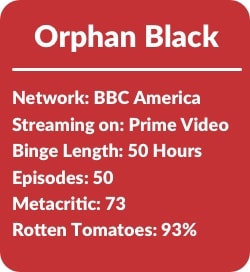This article is part of our One Perfect Binge bracket project. Follow along with here for updates and on Twitter, keep tabs with #OnePerfectBinge.
 Lindsay Lohan did it in The Parent Trap. Nic Cage did it in Adaptation. But in Orphan Black, Tatiana Maslany takes dual-acting to another level, playing not two, not three, but more than a dozen different characters.
Lindsay Lohan did it in The Parent Trap. Nic Cage did it in Adaptation. But in Orphan Black, Tatiana Maslany takes dual-acting to another level, playing not two, not three, but more than a dozen different characters.
In Graeme Manson’s criminally underseen sci-fi series, a group of women comes together when they discover they are all genetically identical. And being methodically hunted down one by one. While the show is engaging and thrilling in any sense, it’s Maslany’s impressive range that makes Orphan Black a prime candidate for binge-watching.
The Canadian actress stars in the series as an ever-growing group of clones working together to uncover the truth behind their origin. As the mystery of their creation untangles from every direction, the Clone Club, as they so affectionately refer to each other, expands. More often than not, Maslany plays multiple characters in one scene (and even sometimes in one shot), giving not just one incredible performance, but a collection of them.
The first clone we meet is Sarah Manning, the series’ primary protagonist. She’s a gritty British drifter who wears The Clash t-shirts with ripped fishnets and has chronically smudged, day-old makeup. When she witnesses the suicide of an evidently high-class businesswoman who looks identical to her (save for their respective wardrobes), Sarah decides to steal her identity, at least for as long as it takes to clean out her bank account.
With Maslany playing Sarah playing the now-deceased Detective Beth Childs, the show quickly becomes a masterclass in acting. Clones impersonating each other becomes a recurring motif in Orphan Black and it’s never not amusing to watch Maslany seamlessly bounce from one character to another, especially as she finds humor in the grey areas between them, like when Sarah steps in to interrogate another clone’s husband for her.
From the very first episode, Maslany is in complete control of each character, consistently making subtle but genius acting choices; in the most high-stress situations, Sarah’s accent peeks out from behind her imitation of Beth’s flat, Toronto intonation.
First and foremost, the clones’ variety of accents allow for easy differentiation between them. Beyond using accents as a surface-level distinction, Maslany roots her characterization of each clone in the way they speak; Sarah’s Estuary English accent fits her biting, rough-around-the-edges personality the same way Canadian soccer mom Alison’s repressed lilt and Cosima’s soft, San Francisco stoner voice fit their characters.
In addition to the obvious dialect and costume differentiations between the clones, Maslany’s embodiment of each of the personas is evident down to the smallest mannerisms. From the slight changes in her posture to the unique ways each clone holds their hands when they’re nervous, there’s a sense of such subtle confidence in the way Maslany performs. Without a script or hair and makeup, the differences in how she physically carries herself are even more clear when she improvs as each clone.
Although they seek the same big-picture result (read: peacefully existing, not being murdered), each of the clones is a very different person who has lived a very different life. They’ve all grown up in completely disparate environments — one in the affluent Toronto suburbs, one raised and radicalized by a religious cult in Ukraine, one self-aware of her existence as a clone in England, etc. — and it’s clear Maslany puts care into making sure each performance is just as different as their lives are.
To me, these minute differences become more obvious and therefore more exciting when binge-watching the series. Being introduced to each character in such rapid-fire succession is fascinating because it allows you to remember everyone, even those who may pop up for only an episode or two. Without the opportunity to forget her smaller roles over the five-year span in which the show ran, bingeing Orphan Black only makes Maslany’s talent more apparent.
While dual-acting is certainly not unheard of, playing so many roles for 50 episodes is an impressive feat worthy of praise. Maslany’s devotion to Orphan Black is unprecedented, and she carries the show easily. She never shies away from committing wholeheartedly of any of the clones and fearlessly navigates each character she plays, even the most brutal of villains. Once you start dedicating time to Orphan Black and to Maslany as an actress, you can’t help but click Next Episode for hours on end, impatient to see where she could possibly go next and surprised nonetheless when she gets there.
0 comments:
Post a Comment